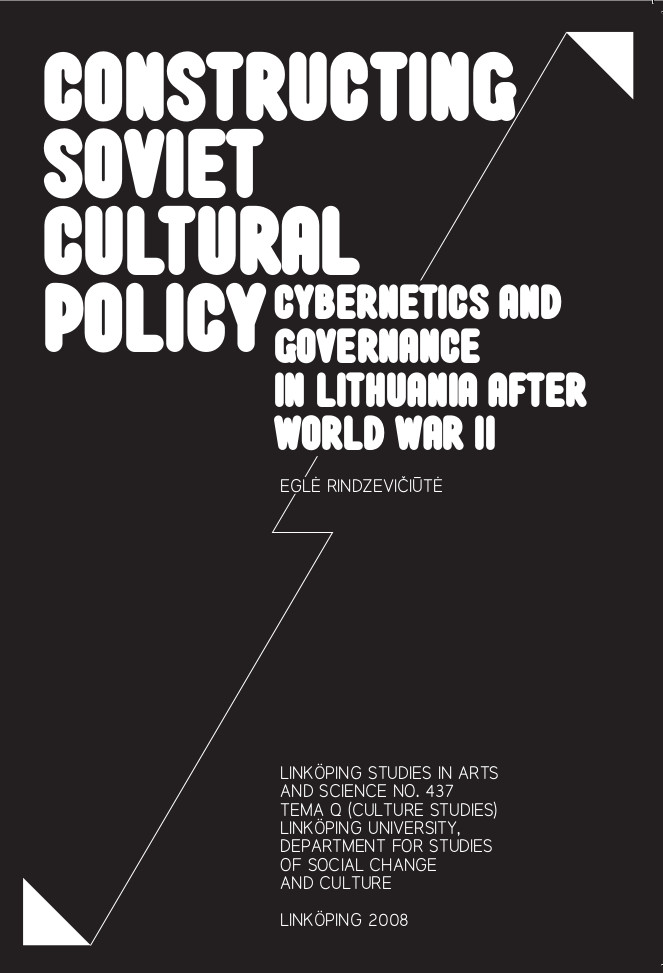Egle Rindzevičiūtė: Constructing Soviet Cultural Policy: Cybernetics and Governance in Lithuania after World War II (2008)
Filed under thesis | Tags: · cybernetics, governance, lithuania, politics, soviet union, technology

After World War I, the Soviet Union was one of the first modern states to engage explicitly in the governance of culture, which was formalised and institutionalised as state cultural policy. In this process of governance, sciences and technologies provided the state with conceptual and material resources, which were used to define both the process and the object of governance. After World War II, scientific and technological progress gave birth to a new science of control and communication, Norbert Wiener’s cybernetics, which was widely used not only in engineering, but also in the conceptualisation of humans, machines and societies. This thesis explores how cybernetics influenced the construction of cultural policy in the Soviet Union. It focuses particularly on the Soviet republic of Lithuania. The main argument is that since the 1950s a particularly powerful discourse of cybernetic governance was formed in the Soviet Union. A result of translation from techno-science, this discourse not only served the purposes of authoritarian rule, but was also used as a resource by cultural operators to criticise the Soviet government itself. By analysing organisational practices and official and public discourses, the study reveals the complexity of the relationship between governance, culture and sciences and technologies.
Doctoral thesis
Faculty of Arts and Sciences, Linköping University, 2008
274 pages
Peter Romijn, Giles Scott-Smith, Joes Segal (eds.): Divided Dreamworlds? The Cultural Cold War in East and West (2012)
Filed under book | Tags: · cold war, culture, design, genetics, modernism, politics, popular music

“While the divide between capitalism and communism, embodied in the image of the Iron Curtain, seemed to be as wide and definitive as any cultural rift, Giles Scott-Smith, Joes Segal, and Peter Romijn have compiled a selection of essays on how culture contributed to the blurring of ideological boundaries between the East and the West. This important and diverse volume presents fascinating insights into the tensions, rivalries, and occasional cooperation between the two blocs, with essays that represent the cutting edge of Cold War Studies and analyze aesthetic preferences and cultural phenomena as various as interior design in East and West Germany; the Soviet stance on genetics; US cultural diplomacy during and after the Cold War; and the role of popular music as the universal cultural ambassador. An illuminating and wide-ranging survey of interrelated collective dreams from both sides of the Iron Curtain, Divided Dreamworlds? has a place on the bookshelf of any modern historian.”
Publisher Amsterdam University Press, 2012
Studies of the Netherlands Institute for War Documentation series, 5
Creative Commons BY-NC-ND 3.0 License
ISBN 9089644369, 9789089644367
248 pages
Intergovernmental Panel on Climate Change: Fifth Assessment Report: The Physical Science Basis (2013)
Filed under report | Tags: · climate crisis, environment, global warming, science

The first of three parts of the Fifth Assessment Report (AR5) focuses on the scientific evidence behind climate change and the human role in it. The Intergovernmental Panel on Climate Change (IPCC) has been meeting in Stockholm this week to discuss the final wording of the summary of Working Group One (WG1), which assesses the physical science, such as concentrations of greenhouse gases in the atmosphere, temperature rises and climate models. It has been written the world’s top climate scientists – 209 lead authors and 50 editors from 39 countries. This summary report will be followed by Working Group I’s full in-depth report on Monday, 30 September.
Set up in 1988, the IPCC is a United Nations body that evaluates the state of climate science. It produces major assessments every five-seven years. The last report, published in Paris in 2007, said that scientists were 90% certain that humans were responsible for global warming. The panel was awarded the Nobel peace prize in the same year, shared jointly with former US vice–president, Al Gore.
Working Group II’s report on Impacts, Adaptation and Vulnerability is scheduled to be released in mid March 2014, followed by Working Group III’s Mitigation of Climate Change in early April 2014. AR5 Synthesis Report (SYR) will be released in October 2014.
AR5 Media Portal
UN_ClimateTalks at Twitter
IPCC at Twitter
IPCC Fifth Assessment Report at Wikipedia
Live coverage by The Guardian (27 September)
Global warming likely to breach 2C threshold, climate scientists conclude (summary by Fiona Harvey for The Guardian)
FAQs answered by Adam Vaughan (The Guardian)
Report summary (28 pp, 2 MB, updated on 2015-2-6)
Full report (1535 pp, 375 MB, updated on 2015-2-6)
Press release (27 September 2013)
Other formats and translations (added on 2015-2-6)

